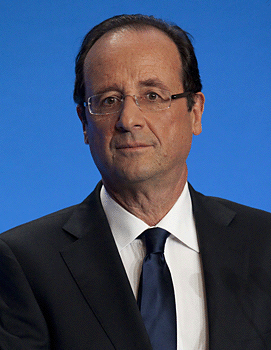EU Faces Rising Opposition
Thursday, May 29th, 2014May 29, 2014
Leaders of the 28-member nations of the European Union (EU) met in Brussels this week in response to recent European Parliament elections that gave a boost to a number of Eurosceptic (anti-EU) parties. Both the president of France and the prime minister of the United Kingdom called for major EU reforms. French President Francois Hollande warned Europe to “pay attention” to the election results in France, where his Socialist party lost to the far-right National Front. The National Front—which some have called a neo-Nazi party—collected fully 24.95 percent of the vote, winning a nationwide election for the first time. France’s Socialist Prime Minister Manuel Valls characterized the results as “more than a warning. It is a shock, an earthquake.”

(© Stephen Hird, Reuters)

French President Francois Hollande (above) and British Prime Minister David Cameron (right) both called for EU reforms in the face of strong showings by far-right parties in European elections (© Balint Porneczi, Bloomberg/Getty Images).
Populist and far-right parties gained ground across the EU, including in Austria, Denmark, Greece, and the United Kingdom. In Britain, Prime Minister David Cameron’s Conservative party lost to the United Kingdom Independence Party (UKIP). UKIP campaigned to slash the EU’s powers and return decision-making to individual nations. In Greece, Golden Dawn, an openly neo-Nazi organization, also picked up seats.
Despite the unprecedented gains made by such extremist parties, the pro-EU bloc retains a safe majority in the parliament. Nevertheless, the current president of the European Parliament, Martin Schulz, noted: “This is a bad day for the European Union when the party [the National Front] with such an openly racist, xenophobic and anti-Semitic program gets 25 or 24 percent of the vote in France. . . . The reasons behind such a vote for a party like this party in France is not that people are hard-core extremists. . . .They are disappointed. They have lost trust and hope [in the EU].” International affairs experts note that much of the lost trust and hope stems from years of recession and the necessity of granting massive financial bailouts to various eurozone countries to keep them from defaulting on their national debts. (The eurozone consists of the 18 EU nations that adopted the euro, the common European currency.)
Additional World Book articles:
- Crisis in the Eurozone (a special report)
- Eurozone Crisis: No End in Sight (a special report)


